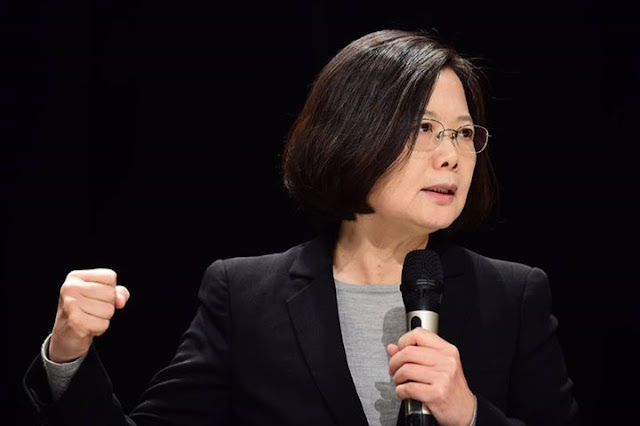 |
| Source |
Don't get me wrong, I have no interest in Hilary Clinton becoming the next president of the United States, but Taiwan deserves major kudos for electing its first female president in its history, Tsai Ying-Wen—a feat we Americans have yet to achieve.
Who is Tsai? In a nutshell, she is a 59-year-old professor-turned-politician and prominent member of Taiwan's democratic party. Hailing from southern Taiwan, the calm, mild-mannered Tsai rightfully takes her place as the island new president as she is of Hakka and aboriginal Taiwanese decent.
Arguably, thanks to many Taiwanese's distrust of the former President Ma and his cozy relationship with the Chinese Communist Party, Tsai was able to nab a convincing 60% of the votes in the recent presidential election.
Many think her new position as president marks a major shift in Taiwanese politics toward establishing an autonomous country and possibly separating from Mainland China. But I think not. I believe the status quo between Taiwan and China will remain relatively unchanged, albeit the ground is quite fertile for further hostilities.
I think it almost goes without saying that Taiwan cannot survive on its own without recognition for the world's biggest powers or economic support from the Mainland. As several countries are dependent on China, I do no see the former happening anytime soon; at the moment, no one wants to compromise their economic relationship with China.
Therefore, I feel the most important objective for Tsai will be to ease and possibly resolve the pattern of economical disparity in Taiwan as well as encourage a first-world mindset in the country. Technology, infrastructure, and (English) language learning is one thing, but what use is modernizing your country on the surface without updating its worldview?
Who is Tsai? In a nutshell, she is a 59-year-old professor-turned-politician and prominent member of Taiwan's democratic party. Hailing from southern Taiwan, the calm, mild-mannered Tsai rightfully takes her place as the island new president as she is of Hakka and aboriginal Taiwanese decent.
Arguably, thanks to many Taiwanese's distrust of the former President Ma and his cozy relationship with the Chinese Communist Party, Tsai was able to nab a convincing 60% of the votes in the recent presidential election.
Many think her new position as president marks a major shift in Taiwanese politics toward establishing an autonomous country and possibly separating from Mainland China. But I think not. I believe the status quo between Taiwan and China will remain relatively unchanged, albeit the ground is quite fertile for further hostilities.
I think it almost goes without saying that Taiwan cannot survive on its own without recognition for the world's biggest powers or economic support from the Mainland. As several countries are dependent on China, I do no see the former happening anytime soon; at the moment, no one wants to compromise their economic relationship with China.
Therefore, I feel the most important objective for Tsai will be to ease and possibly resolve the pattern of economical disparity in Taiwan as well as encourage a first-world mindset in the country. Technology, infrastructure, and (English) language learning is one thing, but what use is modernizing your country on the surface without updating its worldview?
In my opinion, Tsai is in a good position to strengthen relationships with other countries around the world, and to inspire those in the Mainland who are disillusioned with the CCP. Let's not forget, there are many who reside in China who are just as unhappy as the Taiwanese; it would be wise not to alienate them.
–
No comments:
Post a Comment